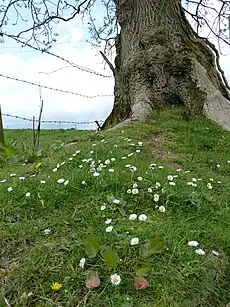| Cheilosia albipila | |
|---|---|
_-_Red-horned_Spring-cheilosia.jpg.webp) | |
| Cheilosia albipila male | |
| Scientific classification | |
| Domain: | Eukaryota |
| Kingdom: | Animalia |
| Phylum: | Arthropoda |
| Class: | Insecta |
| Order: | Diptera |
| Family: | Syrphidae |
| Genus: | Cheilosia |
| Species: | C. albipila |
| Binomial name | |
| Cheilosia albipila Meigen, 1838 | |
| Synonyms[1][2] | |
Cheilosia albipila is a European and Palearctic species of hoverfly. Like most Cheilosia it is black, and because of this may often be overlooked as a hoverfly. It is little recorded but probably widespread and common and maybe overlooked because adult flight periods are early in the year, before many hoverfly recorders are active.[3]
Description
External images.Wing length 8·75-10·75 mm. The wings are unclouded. The entire pubescence is long and reddish. The tergites have a purple sheen. The antennae are clear orange, the tip sometimes slightly darkened. The face of the male with the central prominence sometimes peculiarly depressed at middle. Female has yellow femora and tarsi.[4] [5] [6][7] The larva is illustrated by Rotheray (1993)[8]
Distribution
It is distributed from Scandinavia to south of the Pyrenees, and from Ireland eastwards through much of northern and central Europe and European parts of Russia and central Siberia.[9][10][11]

Biology
Habitat tracks and clearings in forest and at the edge of woodland and tracks through carr. The larvae of C. albipila feed inside the base of the stems of Marsh Thistles (Cirsium palustre') Adult Females lay eggs in the rosettes of mature plants in early spring when adults are most active. Usually there is only one larvae per plant and they feed by tunnelling up the pithy centre of the main thistles stem. The larvae mature about mid to late June in southern UK and then leave the plant to pupate in the soil around the thistle. Flight times of adults are Late February to May, peeking around mid April.[3] Adults feed on Bellis, Betula, Caltha, Cardamine, Corylus, Prunus spinosa, Ribes uvacrispa, Salix, Taraxacum, Tussilago and Vaccinium.[12] [13]
References
- ↑ Stubbs, Alan E.; Falk, Steven J. (1983). British Hoverflies: An Illustrated Identification Guide. British Entomological & Natural History Society. pp. 253, xvpp.
- ↑ Chandler, Peter J. (1998). "Checklists of Insects of the British Isles (New Series) Part 1: Diptera". Handbooks for the Identification of British Insects. 12. Royal Entomological Society: 1–234.
{{cite journal}}: Cite journal requires|journal=(help) - 1 2 Stuart Ball; Roger Morris; Alan Stubbs (2008-07-10). "Recording Cheilosia albipila and C. grossa by searching for larvae in thistles" (PDF). Hoverfly Recording Scheme. Archived from the original (PDF) on 2012-02-20. Retrieved 2009-01-19.
- ↑ Van Veen, M. (2004) Hoverflies of Northwest Europe: identification keys to the Syrphidae. 256pp. KNNV Publishing, Utrecht.
- ↑ Van der Goot,V.S. (1981) De zweefvliegen van Noordwest - Europa en Europees Rusland, in het bijzonder van de Benelux. KNNV, Uitgave no.32: 275pp. Amsterdam.
- ↑ Bei-Bienko, G.Y. & Steyskal, G.C. (1988) Keys to the Insects of the European Part of the USSR, Volume V: Diptera and Siphonaptera, Part I. Amerind Publishing Co., New Delhi. ISBN 81-205-0080-6.
- ↑ Coe, R.L. (1953) Diptera: Syrphidae. Handbks.ident.Br.insects, 10(1): 1-98. R.ent.Soc.London. pdf Archived 2018-10-04 at the Wayback Machine
- ↑ Rotheray G., 1993 Colour Guide to Hoverfly Larvae Diptera, Syrphidae in Britain and Europe Dipterists Forum pdf Archived 2019-04-03 at the Wayback Machine
- ↑ Radisic, P.; Papadopoulos, G.; Vujic, A. & Simic, S. (2001). "Pollen Feeding of Cheilosia Albipila Meigen, 1838 (Diptera: Syrphidae)" (PDF). Acta Entomologica Serbica. 6 (1): 83–92. ISSN 0354-9410. Archived from the original (PDF) on 2011-09-10. Retrieved 2010-05-27.
- ↑ Peck, L.V. (1988) Syrphidae. In: Soos, A. & Papp, L. (eds.) Catalogue of Palaearctic Diptera, 8: 11-230. Akad.Kiado, Budapest.
- ↑ Fauna Europaea
- ↑ de Buck, N. (1990) Bloembezoek en bestuivingsecologie van Zweefvliegen (Diptera, Syrphidae) in het bijzonder voor België. Doc.Trav. IRSNB, no.60, 1-167.
- ↑ Speight, M.C.D. (2011). "Species accounts of European Syrphidae (Diptera)" (PDF). Syrph the Net, the Database of European Syrphidae. 65: 285pp.